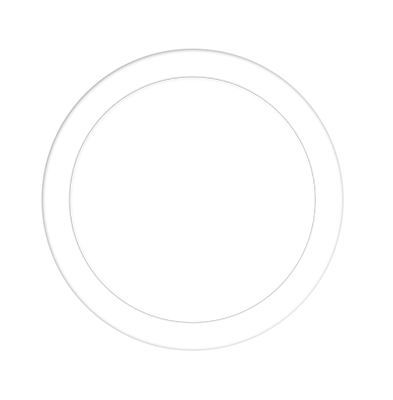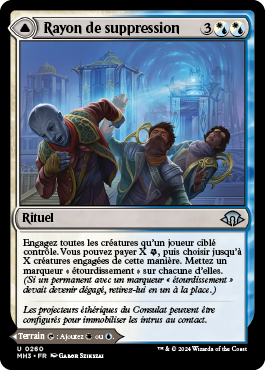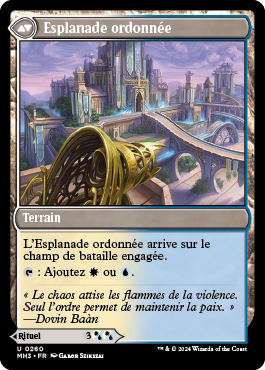

|
Card Name:
Rayon de suppression
Card Text:
Engagez toutes les créatures qu'un joueur ciblé contrôle. Vous pouvez payer X  , puis choisir jusqu'à X créatures engagées de cette manière. Mettez un marqueur « étourdissement » sur chacune d'elles. (Si un permanent avec un marqueur « étourdissement » devait devenir dégagé, retirez-lui en un à la place.)
Terrain
Flavor Text:
Les projecteurs éthériques du Consulat peuvent être configurés pour immobiliser les intrus au contact.
|
Rulings
| 6/7/2024 |
"Creatures tapped this way" means creatures that became tapped as a result of Suppression Ray's effect, not creatures that were already tapped before Suppression Ray began to resolve. For example, if a player controls two tapped creatures and one untapped creature and you cast Suppression Ray targeting that player, you'll only be able to choose the creature that was untapped to get a stun counter (as long as you paid at least one  ). ). |
| 6/7/2024 |
 is the energy symbol. It represents one energy counter. is the energy symbol. It represents one energy counter. |
| 6/7/2024 |
Energy counters are a kind of counter that a player may have. They're not associated with any specific permanents. |
| 6/7/2024 |
Keep track of how many energy counters each player has. Potential ways to track this include writing theme down on paper or using dice, but any method that is clear and mutually agreeable is fine. (At higher levels of tournament play, dice may not be allowed for tracking counters that players have.) |
| 6/7/2024 |
If an effect says you get one or more  , you get that many energy counters. To pay one or more , you get that many energy counters. To pay one or more  , you lose that many energy counters. You can't pay more energy counters than you have. Any effects that interact with counters a player gets, has, or loses can interact with energy counters. , you lose that many energy counters. You can't pay more energy counters than you have. Any effects that interact with counters a player gets, has, or loses can interact with energy counters. |
| 6/7/2024 |
Energy counters aren't mana. They don't go away as steps, phases, and turns end, and effects that add mana "of any type" can't give you energy counters. |
| 6/7/2024 |
Some triggered abilities state that you "may pay" a certain amount of  . You can't pay that amount multiple times to multiply the effect. You simply choose whether or not to pay that amount of . You can't pay that amount multiple times to multiply the effect. You simply choose whether or not to pay that amount of  as the ability resolves. as the ability resolves. |
| 6/7/2024 |
Some triggered abilities that state that you "may pay" a certain amount of  describe an effect that happens "If you do." In that case, no player may take actions to try to stop the ability's effect after you make your choice. If the payment is followed by the phrase "When you do," then you'll choose any targets for that reflexive triggered ability and put it on the stack before players can take actions. describe an effect that happens "If you do." In that case, no player may take actions to try to stop the ability's effect after you make your choice. If the payment is followed by the phrase "When you do," then you'll choose any targets for that reflexive triggered ability and put it on the stack before players can take actions. |
| 6/7/2024 |
If a spell or ability with one or more targets states that you "may pay" some amount of  , and each permanent that it targets has become an illegal target, the spell or ability won't resolve. You can't pay any , and each permanent that it targets has become an illegal target, the spell or ability won't resolve. You can't pay any  even if you want to. even if you want to. |
| 6/7/2024 |
Some spells and abilities that give you  may require targets. If each target chosen is an illegal target as that spell or ability tries to resolve, it won't resolve. You won't get any may require targets. If each target chosen is an illegal target as that spell or ability tries to resolve, it won't resolve. You won't get any  . . |
| 6/7/2024 |
To determine whether it is legal to play a modal double-faced card, consider only the characteristics of the face you're playing and ignore the other face's characteristics. For example, if an effect stops you from casting creature spells, you can't cast Disciple of Freyalise, but you can still play Garden of Freyalise. |
| 6/7/2024 |
If an effect allows you to play a specific modal double-faced card, you may cast it as a spell or play it as a land, as determined by which face you choose to play. If an effect allows you to cast (rather than "play") a specific modal double-faced card, you can't play it as a land. |
| 6/7/2024 |
If an effect allows you to play a land or cast a spell from among a group of cards, you may play or cast a modal double-faced card with any face that fits the criteria of that effect. For example, if an effect allows you to play lands from your graveyard, you can play Garden of Freyalise, but you can't cast Disciple of Freyalise. |
| 6/7/2024 |
If an effect allows you to put a card with particular characteristics onto the battlefield without instructing you to play or cast it, you consider only the characteristics of a modal double-faced card's front face to see if that card qualifies. If it does, it enters the battlefield with its front face up. For example, if an effect allows you to put a creature card from your graveyard onto the battlefield, you can put Disciple of Freyalise onto the battlefield. However, an effect that lets you return a land card from your graveyard to your hand won't let you return Garden of Freyalise to your hand, as that card has only its front face's characteristics while in the graveyard. |
| 6/7/2024 |
The mana value of a modal double-faced card is based on the characteristics of the face that's being considered. On the stack or the battlefield, consider whichever face is up. In all other zones, consider only the front face. This is different than how the mana value of a transforming double-faced card is determined. |
| 6/7/2024 |
A modal double-faced card can't be transformed or be put onto the battlefield transformed. Ignore any instruction to transform a modal double-faced card or to put one onto the battlefield transformed. |
|
|


|
Card Name:
Esplanade ordonnée
Card Text:
L'Esplanade ordonnée arrive sur le champ de bataille engagée.
Rituel
Flavor Text:
« Le chaos attise les flammes de la violence. Seul l'ordre permet de maintenir la paix. » —Dovin Baàn
|
Rulings
| 6/7/2024 |
To determine whether it is legal to play a modal double-faced card, consider only the characteristics of the face you're playing and ignore the other face's characteristics. For example, if an effect stops you from casting creature spells, you can't cast Disciple of Freyalise, but you can still play Garden of Freyalise. |
| 6/7/2024 |
If an effect allows you to play a specific modal double-faced card, you may cast it as a spell or play it as a land, as determined by which face you choose to play. If an effect allows you to cast (rather than "play") a specific modal double-faced card, you can't play it as a land. |
| 6/7/2024 |
If an effect allows you to play a land or cast a spell from among a group of cards, you may play or cast a modal double-faced card with any face that fits the criteria of that effect. For example, if an effect allows you to play lands from your graveyard, you can play Garden of Freyalise, but you can't cast Disciple of Freyalise. |
| 6/7/2024 |
If an effect allows you to put a card with particular characteristics onto the battlefield without instructing you to play or cast it, you consider only the characteristics of a modal double-faced card's front face to see if that card qualifies. If it does, it enters the battlefield with its front face up. For example, if an effect allows you to put a creature card from your graveyard onto the battlefield, you can put Disciple of Freyalise onto the battlefield. However, an effect that lets you return a land card from your graveyard to your hand won't let you return Garden of Freyalise to your hand, as that card has only its front face's characteristics while in the graveyard. |
| 6/7/2024 |
The mana value of a modal double-faced card is based on the characteristics of the face that's being considered. On the stack or the battlefield, consider whichever face is up. In all other zones, consider only the front face. This is different than how the mana value of a transforming double-faced card is determined. |
| 6/7/2024 |
A modal double-faced card can't be transformed or be put onto the battlefield transformed. Ignore any instruction to transform a modal double-faced card or to put one onto the battlefield transformed. |
|
|